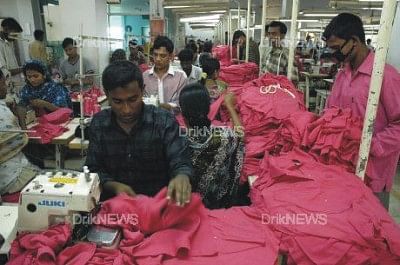When workers are enraged

Photo: Noor Alam/ Drik News
In recent days the discontent among garments workers has increased at such an alarming rate that if we cannot come up with a solution we will have to pay for it severely. These days, when the inflation in food items is over 10% and when the other expenses are so high, how can a garment worker survive on only Tk.3,000-4,000? The discontentment leads to frequent strikes, violence, damage to property and deaths.
Garment workers send their family members, especially little children, to do hazardous work and thus risk their lives. So, one problem breeds many other problems that remain unnoticed when we talk about the workers' wages. Even the working environment, health and sanitation, security and other vital things are ignored.
Most garment factories do not follow the labour law and ILO conventions. The Labor Act, 2006 clearly stipulates that the wages of a worker must be paid within seven workings days of the completion of the stipulated wage period [Section 123 (1)]. This is not followed in practice. In addition, some of the factories do not provide appointment letters/contract letters, identity cards and service books. Health safety and security condition are also not sufficient.
When workers have to struggle for a minimum liveable wage, how can they demand the other rights that they never get in their working place? Our country has become dependent on the garments sector only, and when a country stands on only one sector there are some risks. If, for any reason, the sector falls, the entire economy of the country goes down.
We should look for some other sectors that will go side by side with the garment sector and a diversified forward and backward linkage will thus be created, which will minimise the risk and result in more employment and more wages for the workers. Even the loss from violence, strike and destruction is immeasurable, and the loss of life is really very shocking and, indeed, a shame for us as a nation.
We, as a nation, are very adaptive; we can easily take every unbearable thing as common-place. At first we shake our heads on seeing the news in newspapers, we wonder about the fate of the country and, after a while, we forget. Things go on as usual.
According to a global survey released on June 19, Bangladesh garment workers are the world's "most poorly paid," with about $24 or Tk.1,662.50 monthly pay. The garment sector accounts for about 80% of the total share of exports and earned $12.7 billion in 2008-09. This was about 14 % of the country's GDP.
Bangladesh has about 2,500 garment factories with up to 10 million livelihoods dependent on them directly or indirectly. About 80% of the garment workers are women. The readymade garments (RMG) sector has more potential than any other sector to contribute to the reduction of poverty. Despite the phenomenal success of the RMG sector the working conditions and wages of workers in the industry are causes for serious concern.
On July 29, a new minimum wage for garment workers in Bangladesh was set at Tk.3,000 a month ($40), a rise of 80% on the Tk.1,662.50 ($24) agreed in 2006. Following this announcement, angry workers demonstrated all over Dhaka, vandalising shops, setting fire to cars, wrecking machinery, and even attacking the upmarket shopping area of Gulshan Circle. The workers are demanding a minimum of Tk.5,000 (about $70). But our government did not pay heed to it. It should be remembered that exploitation of workers never does good to any industry.
Violent protests by garment workers are common in Bangladesh. Garment factories export more than $10 billion worth of products a year, mainly to the United States and Europe. But the garment workers in Bangladesh are the lowest paid in the world, and the recent rise does little to remedy their position. The World Bank reported in May 2010 that Bangladesh is the third largest exporter of garments after China and Turkey.
Workers get $1.66 an hour in China, 56 cents in Pakistan, 51 cents in India, 44 cents in Indonesia, and 36 cents in Bangladesh. This is an overestimate: anyone on the new minimum of Tk.3,000 will be earning little over 12.5 cents an hour for a 60-hour week.
What has emerged quite emphatically is that, for the Bangladesh industry to survive, it has to take on board the issue of "compliance" with internationally recognised social, labour and environmental standards. There are many initiatives underway -- buyers have their corporate social responsibility initiatives, the government has set up task forces, and there are the Memoranda of Understanding with the trade unions and the manufacturers' and exporters' associations.
There are many stakeholders and dialogue is imperative, but how much these initiatives work needs to be scrutinised. There need to be the capacity and will amongst all the stakeholders, and particularly the government, to take forward and develop "compliance" and create an industry with an enhanced global image and global recognition of performance.
For industrial growth we need more profit from this sector, but not by demolishing the vital agent or factor of production -- labour. Let us find out a solution that will at least keep the workers alive; it will be beneficial for all of us, the entire nation.
The RMG firms in Bangladesh have been facing immense pressures from international buyers for compliance with their codes of conduct. In contrast, the big buyers are interested in continuing and expanding their business with Bangladesh if shorter lead time and compliance standards can be met.
Therefore, Bangladesh should address these two issues, which are the least conditions necessary to survive the competition, very carefully and immediately. And for this we need to come out of "The Iron Law of Wage" immediately.

 For all latest news, follow The Daily Star's Google News channel.
For all latest news, follow The Daily Star's Google News channel. 



Comments